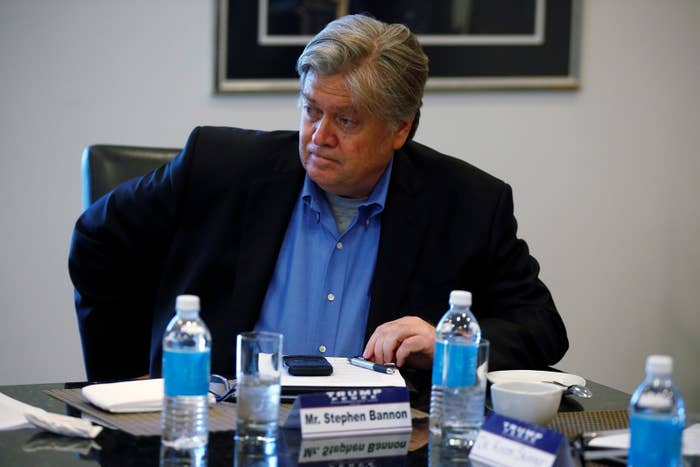
Donald Trump's new campaign CEO, Breitbart News executive Steve Bannon, two years ago laid out a a global mission to push the whole world to the right.
In 2014, Bannon gave the address via video to a conference held inside the Vatican. The event — hosted by the Human Dignity Institute, which was founded by a long-time aid to Conservative member of the European Parliament Nirj Deva to promote a "Christian voice" in European politics — took as its theme the Catholic responses to poverty. While many attendees work on issues like abortion and marriage, Bannon primarily wanted to talk about the global battle against centralized government and the "global war against Islamic fascism."
"We believe strongly that there is a global tea party movement," Bannon said, speaking of his work at Breitbart, boasting that "we were the first group to get in and start reporting" on European far right parties like Great Britain's UKIP and France's Front National.
"You’re seeing a global reaction to centralized government, right. Whether that government’s in Beijing or whether that government’s in Washington, D.C., or that government’s in Brussels. So we are the platform for the voice of that," he said.
"The central thing that binds that all together is a center-right populist movement of really the middle class, the working men and women in the world, who are just tired of being dictated to by what we call the Party of Davos," he said, referring to the Swiss city that hosts the World Economic Forum. "We’re not conspiracy theory guys," he said, it's a reaction against "people in New York who feel close to people in London and in Berlin than to people in Kansas and in Colorado. Right, and they have more of this kind of elite mentality that they’re going to dictate to everybody how the world’s going to be run. Well, I will tell you, that the working men and women of Europe and Asia and the United States and Latin America don’t believe that. They believe they know what’s best for how they will comport their lives."
He also said international alliances were especially important because "we're at the beginning stages of a global conflict, and that if we do not bind together with partners in other countries that this conflict is only going to metastasize," he said.
He continued, "They have a Twitter account up today, ISIS does, about turning the United States into a river of blood if it comes in a tries to defend the city of Baghdad. And trust me, that is going to Europe. That is going to come to central Europe, it’s going to come to Western Europe, it’s going to come to the United Kingdom. And so I think that we are in a crisis, like I said, a crisis of capitalism and really the underpinnings of capitalism, and on top of that, we’re now, I believe at the beginning stages of a global war against Islamic fascism."
He saw this populist movement extending to India, too, which had just elected a new prime minister, Narendra Modi of the right-wing Bharatiya Janata Party, which has ties to Hindu nationalists.
"Modi's great victory was very much based on these kind of Reaganesque principles. So I think this is a global revolt, and we are very fortunate and proud to be the news site that is reporting that throughout the world," he said.
He also spoke approvingly of aspects of the regime of Vladimir Putin, despite linking the ideology of some of his advisors to Italian Fascism and saying that he did not want to justify "the kleptocracy that [Putin] represents."
"When Vladimir Putin, if you really look at some of the underpinnings of some of his beliefs today, a lot of those come from what I call Eurasianism, you know, he's got an adviser that’s harkens back to... writers of the early 20th century, who are really the supporters of what's called the traditionalist movement," he said. "Which really kind of metastasized into Italian fascism. A lot of people that are traditionalists are attracted to that."
He contended that one of the reasons that's attractive to those people is that Putin is supporting traditional institutions through nationalism. "I think that people, particularly in certain countries, want to see sovereignty for their country," he said. "They want to see nationalists for their country. They don't believe in this kind of pan-European Union or they don't believe in the centralized government in the United States. They'd rather see more of a states-based entity, where you had how the founders originally set up where freedoms were controlled at the local level."
"I'm not justifying Vladimir Putin and the kleptocracy that he represents, because he eventually really is the state capitalism evil of a kleptocracy," he continued. "However, I think we, especially the Judeo-Christian West, have to really look at what he's talking about as far as traditionalism goes, particularly the sense of where it supports the underpinnings of nationalism."
So Putin can be an important ally in the war against "Islamic fascism," Bannon said, despite rampant corruption.
"I think that Putin and his cronies are really a kleptocracy, that are really a perilous power to expand, however, I really believe that in this current environment, where you're really facing a potential new caliphate, that is very aggressive, that is really a situation — I’m not saying we can put it on the backburner — but I think we have to deal with first things first," he said.
"I happen to think that the individual sovereignty of a country is a good thing and a strong thing," Bannon said. "I think strong countries and strong nationalist movements in countries make strong neighbors, and that is really the building blocks that built Western Europe and the United States and I think it's what can see us forward."
